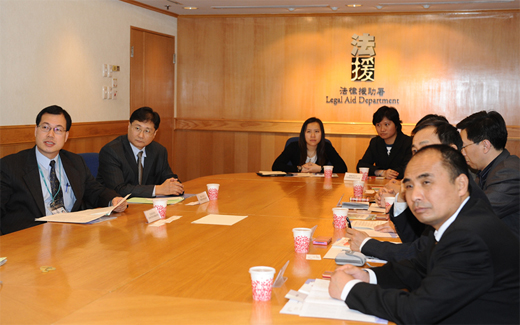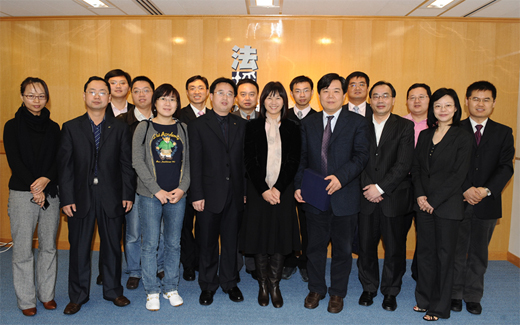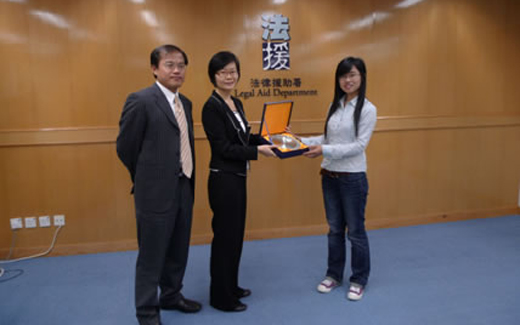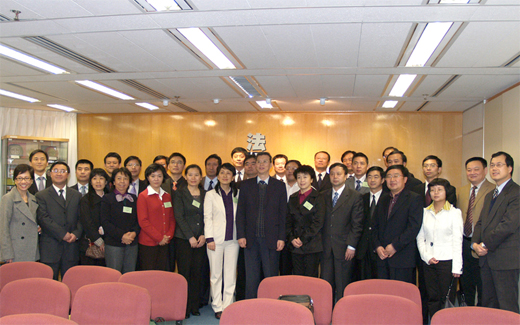Chapter 3
Cases of Public Interest or Concern
Judicial Review and the Protection of the Interests of Prisoners
Mr.X faced losing time off his sentence and launched a constitutional challenge against the Commissioner for Correctional Services (the Commissioner) with the assistance of legal aid. He contended that the disciplinary procedures which applied to prisoners lacked independence or impartiality for a fair hearing under Article 10 of the Hong Kong Bill of Rights (HKBOR).Mr.X, an inmate of Stanley Prison, was determined by a superintendent of the same prison to have committed offences against prison discipline in 5 separate incidents between a certain period in 2007 and 2008. The punishment for the offences included forfeiture of remission of his sentence of imprisonment. Mr.X appealed in 4 of the cases to the Commissioner. All his appeals were dismissed. The notification of appeal in his 5th case was rejected as being out of time.
Mr.X succeeded in the Court of First Instance (CFI) where he argued that as the charges against him was adjudicated by the superintendent of the penal institution in which he was serving his sentence, there was an absence of an independent and impartial tribunal and the Commissioner applied the wrong standard of proof. The judge in the CFI made an order quashing all the determinations and decisions. The Commissioner appealed against the judge's decision.
The main issues on appeal were whether there was basis for the complaint of bias on the part of the superintendent who determined the cases and if yes, whether the whole determination process of prison offences could still be regarded as fair and whether the criminal standard of proof should be applied in prison disciplinary offences.
The appeal judges were split in their views on the issue of whether there was basis for the complaint of bias. One judge considered that there could be apparent bias for a superintendent to adjudicate in disciplinary offences committed in his own penal institution. However the other two judges considered that just because the superintendent was not structurally independent did not mean that was conclusive of a lack of impartiality. Their conclusion was that in this case, the superintendent would be several rungs removed from the officers involved in the direct supervision of prisoners. As a result, the superintendent would be placed in the same category as the Commissioner and there is no reasonable apprehension of bias unless on the facts there is something more to tip the scales.
The Court of Appeal was united in its decision that the correct standard of proof to be applied in prison disciplinary proceedings was beyond reasonable doubt given the "criminal" nature of the alleged offences and the sanction of deprivation of liberty.
Although the Commissioner's appeal was successful in relation to the issue which occupied the material part of the argument, namely the issue of impartiality, the order of the CFI quashing the decisions and punishment was only reversed in one of the 5 cases as the Court of Appeal in reaffirming the decision of the CFI found that prison disciplinary proceedings would involve the determination of a criminal charge within the meaning of article 10 of the HKBOR so that the standard of proof should be proof beyond reasonable doubt as required by article 11(1)1 .
 |
||
|
Assistant
Principal Legal Aid Counsel (Civil Litigation), Mr. Chris Chong (first
from left), and Senior Legal Aid Counsel (Application and Processing),
Mr. Francis Chan (second from left), explained the Department's work to
five Chinese human rights lawyers on 29 March 2010.
|
1Koon Wing Yee v. Insider Dealing Tribunal, supra., paras. 102 to 103; General Comment No. 32 of the Human Rights Committee on Article 14, para. 56
Sentencing Guidelines for Asylum Seekers Or Refugees in Unauthorized Employment
A person who enters or remains in Hong Kong without authority commits
an offence under the Immigration Ordinance. The guideline sentence for
illegally remaining in Hong Kong has since the days of pre-unification
been 15 months imprisonment after guilty plea for a first time offender
( The Queen v. So
Man-king and Others [1989] 1 HKLR 142 ).
Since 1990, it has been the policy of the Department of Justice not to prosecute persons whose presence here was unlawful unless the offender fell within one of three exceptions: one being that he was found in a place of employment. Most offenders were simply repatriated.
As a result of the judgment of the Court of Final Appeal in Secretary for Security v Sakthevel Prabakar (2004) persons who come to Hong Kong legally or otherwise and submit claims under International Conventions recognised in Hong Kong as torture claimants or for asylum or refugee status cannot be removed until their claims have properly been processed. The effect of this was to enable them to remain in Hong Kong. Because they cannot be repatriated until after their claims have been determined, they are released from administrative detention by the Director of Immigration after entering into a recognisance.
For those claimants who had committed immigration offences but were seeking asylum, claiming refugee status or had made a torture claim, the Secretary for Justice confirmed the pre-existing policy not to press for prosecution. Significantly, the prosecution immunity was stated not to apply to anyone found engaged in employment.
Persons who had been released on recognisance and were caught working were therefore prosecuted for their original unlawful presence in Hong Kong. The reason being there was then no specific offence against illegal immigrants taking up employment in Hong Kong.
Since 1990, it has been the policy of the Department of Justice not to prosecute persons whose presence here was unlawful unless the offender fell within one of three exceptions: one being that he was found in a place of employment. Most offenders were simply repatriated.
As a result of the judgment of the Court of Final Appeal in Secretary for Security v Sakthevel Prabakar (2004) persons who come to Hong Kong legally or otherwise and submit claims under International Conventions recognised in Hong Kong as torture claimants or for asylum or refugee status cannot be removed until their claims have properly been processed. The effect of this was to enable them to remain in Hong Kong. Because they cannot be repatriated until after their claims have been determined, they are released from administrative detention by the Director of Immigration after entering into a recognisance.
For those claimants who had committed immigration offences but were seeking asylum, claiming refugee status or had made a torture claim, the Secretary for Justice confirmed the pre-existing policy not to press for prosecution. Significantly, the prosecution immunity was stated not to apply to anyone found engaged in employment.
Persons who had been released on recognisance and were caught working were therefore prosecuted for their original unlawful presence in Hong Kong. The reason being there was then no specific offence against illegal immigrants taking up employment in Hong Kong.
 |
||
|
Deputy
Director of Legal Aid (Litigation), Ms. Jennie Hui (centre front),
Assistant Director of Legal Aid (Litigation), Mr. Allan Chan (fourth
from right) and Assistant Principal Legal Aid Counsel (Civil
Litigation), Ms. Christina Hadiwibawa (second from right) took a group
photograph with a delegation of law professors and researchers from
universities of Mainland China after their visit on 21 January 2010.
|
In Iqbal Shahid
and Others; Waseem Abbas and Others v Secretary for
Justice [2009] 5 HKC 393
it was held on judicial review that prosecuting an asylum seeker or a
torture claimant for illegal presence in Hong Kong was outside the
prosecution policy, even if he had taken up employment. It was also
held that because they were released on recognisance, they had a
defence to the charge of illegally remaining without authority since
release on recognisance constituted an authority from the Director of
Immigration to be here while they were working.
In a direct and rapid response to this judgment at first instance, delivered in March 2009, the administration introduced the Immigration (Amendment) Bill that received a second reading in the Legislative Council as soon as June that year. By November that same year, the new section 38AA of the Immigration Ordinance had entered the statute books.
Sections 38AA (1)(a) and (b) Immigration Ordinance Cap.115 create an offence for anyone who has entered Hong Kong illegally and remains without proper authority, or has been made the subject of a removal or deportation order, to take up any employment or establish any business here, even though they have released from detention with the approval of the Director of Immigration.
The amendment therefore introduced two new immigration offences punishable with a term of imprisonment of up to three years against persons who had and had taken up work here while their claims for asylum, refugee or torture status were being determined where before there was no offence.
Prosecutions of 'non-ethnic Chinese illegal immigrants' ( NECII's ) who had lodged claims for asylum or refugee status and who were found to be working soon commenced.
In the nine-month period following its enactment on 14 November 2009, some 157 NECII's had been sentenced in the magistrates' courts under the new section 38AA of the Immigration Ordinance.
Because the offences under s. 38AA were new offences, no guidelines or consistent sentencing practice had been developed as to the appropriate sentence that should be imposed. In just under one-third of the cases sentences of no more than three months imprisonment were imposed. Over half the cases involved sentences of over 12 months imprisonment: the majority of them being between 14 to 15 months' imprisonment. The sentences in the remainder of cases ranged from three to nine months.
The disparity in the duration of custodial sentences being passed by different magistrates' for the same offence was a source of growing concern to legal practitioners, not to mention their clients, particularly to those who had been sentenced more harshly than other offenders for the same offence committed in identical circumstances.
In a direct and rapid response to this judgment at first instance, delivered in March 2009, the administration introduced the Immigration (Amendment) Bill that received a second reading in the Legislative Council as soon as June that year. By November that same year, the new section 38AA of the Immigration Ordinance had entered the statute books.
Sections 38AA (1)(a) and (b) Immigration Ordinance Cap.115 create an offence for anyone who has entered Hong Kong illegally and remains without proper authority, or has been made the subject of a removal or deportation order, to take up any employment or establish any business here, even though they have released from detention with the approval of the Director of Immigration.
The amendment therefore introduced two new immigration offences punishable with a term of imprisonment of up to three years against persons who had and had taken up work here while their claims for asylum, refugee or torture status were being determined where before there was no offence.
Prosecutions of 'non-ethnic Chinese illegal immigrants' ( NECII's ) who had lodged claims for asylum or refugee status and who were found to be working soon commenced.
In the nine-month period following its enactment on 14 November 2009, some 157 NECII's had been sentenced in the magistrates' courts under the new section 38AA of the Immigration Ordinance.
Because the offences under s. 38AA were new offences, no guidelines or consistent sentencing practice had been developed as to the appropriate sentence that should be imposed. In just under one-third of the cases sentences of no more than three months imprisonment were imposed. Over half the cases involved sentences of over 12 months imprisonment: the majority of them being between 14 to 15 months' imprisonment. The sentences in the remainder of cases ranged from three to nine months.
The disparity in the duration of custodial sentences being passed by different magistrates' for the same offence was a source of growing concern to legal practitioners, not to mention their clients, particularly to those who had been sentenced more harshly than other offenders for the same offence committed in identical circumstances.
 |
||
|
Assistant
Principal Legal Aid Counsel (Crime), Ms. YW Mo (centre) and Legal Aid Counsel Mr. Jason Chan (left) explained
the role and function of Legal Aid Department to a group of law
students and NGO personnel from Mainland China on 29 September 2010.
|
There followed a raft of new applications for legal aid to appeal
against the sentences that were being imposed.
Between November 2009 and September 2010 some 118 new legal aid applications for appeals relating to immigration offences were received and processed by the Crime Section. Of these, legal aid was granted to 37 applicants to appeal against sentence for s. 38AA offence.
Because of the divergent sentences being imposed, it was considered to be of utmost importance to establish authoritative guidance on the issue of the appropriate sentence and to do so quickly. As a result, five cases were specially referred on magistracy appeal to the Court of Appeal so as to enable it to provide sentencing guidelines.
In its judgment delivered on 27 October 2010 in HKSAR v Usman Butt and Others, [2010] 5 HKLRD 452; HCMA 70, 114, 244, 379 and 402/2010 the Court of Appeal observed:
Between November 2009 and September 2010 some 118 new legal aid applications for appeals relating to immigration offences were received and processed by the Crime Section. Of these, legal aid was granted to 37 applicants to appeal against sentence for s. 38AA offence.
Because of the divergent sentences being imposed, it was considered to be of utmost importance to establish authoritative guidance on the issue of the appropriate sentence and to do so quickly. As a result, five cases were specially referred on magistracy appeal to the Court of Appeal so as to enable it to provide sentencing guidelines.
In its judgment delivered on 27 October 2010 in HKSAR v Usman Butt and Others, [2010] 5 HKLRD 452; HCMA 70, 114, 244, 379 and 402/2010 the Court of Appeal observed:
|
Hong
Kong has been exercising the power of
immigration control both
before and after reunification in 1997. Such power is necessary
especially in a place like Hong Kong which is a small area but with a
large population. Resources devoted to meet the needs of its
inhabitants such as housing, education, medical, social benefits and
security are limited and have to be planned on a long term basis.
Immigration control is also needed to ensure there are employment
opportunities for the people.
|
Noting that while illegal immigration from the Mainland has always been
a feature in Hong Kong, the region has also witnessed the Vietnamese
boat people influx in the 1990's and, more recently, claimants of
asylum and torture from developing countries.
The Court of Appeal considered that to allow claimants to undertake employment while their claims are being processed could potentially attract mere economic migrants to Hong Kong.
It was considered that illegal immigration will become less attractive with the risk of a long jail term and that as the deterrent sentence imposed in So Man-king to address the issue of illegal immigration had been effective, that guideline should be applied to all illegal immigrants irrespective of their ethnic origin.
Accordingly, the Court of Appeal held that a deterrent sentence of 15 months' imprisonment upon guilty plea was appropriate for the new offences which were directed against unauthorised employment by NCEII's awaiting asylum torture claim or refugee status determination.
The Court of Appeal considered that to allow claimants to undertake employment while their claims are being processed could potentially attract mere economic migrants to Hong Kong.
It was considered that illegal immigration will become less attractive with the risk of a long jail term and that as the deterrent sentence imposed in So Man-king to address the issue of illegal immigration had been effective, that guideline should be applied to all illegal immigrants irrespective of their ethnic origin.
Accordingly, the Court of Appeal held that a deterrent sentence of 15 months' imprisonment upon guilty plea was appropriate for the new offences which were directed against unauthorised employment by NCEII's awaiting asylum torture claim or refugee status determination.
 |
||
|
Director
of Legal Aid, Mr. William Chan (middle in the front row), Acting Deputy
Director of Legal Aid (Administration), Ms. Alice Chung (first from
left) and Assistant Principal Legal Aid Counsel (Civil Litigation), Mr.
Chris Chong (first from right) received a delegation of 27 senior
judges from China on 22 January 2010 and exchanged views and
experiences on legal aid services.
|